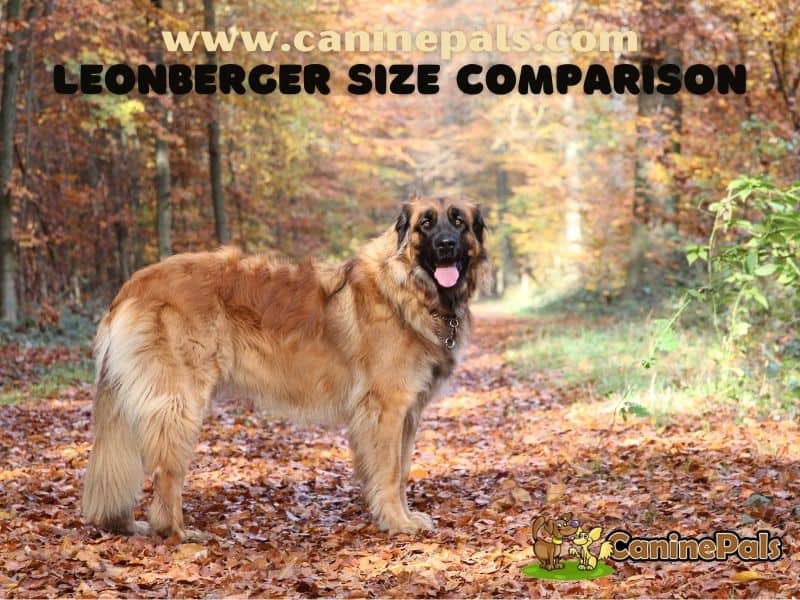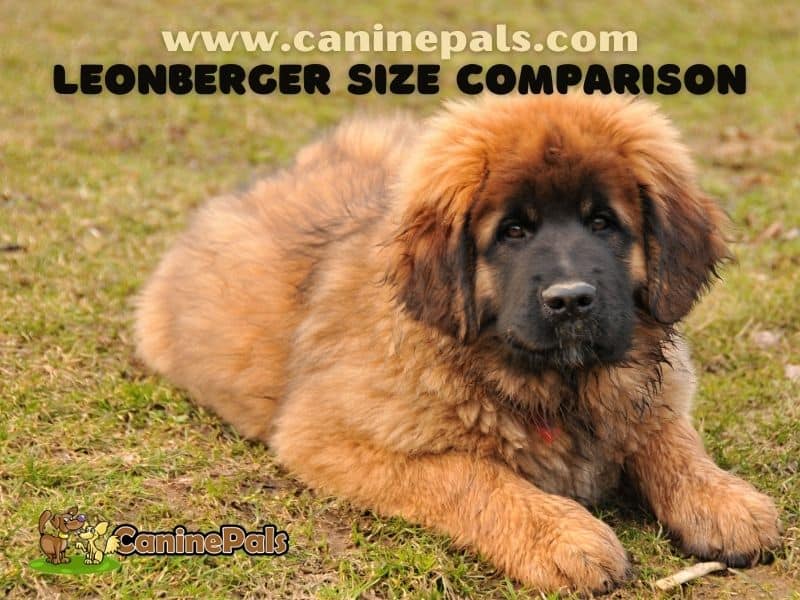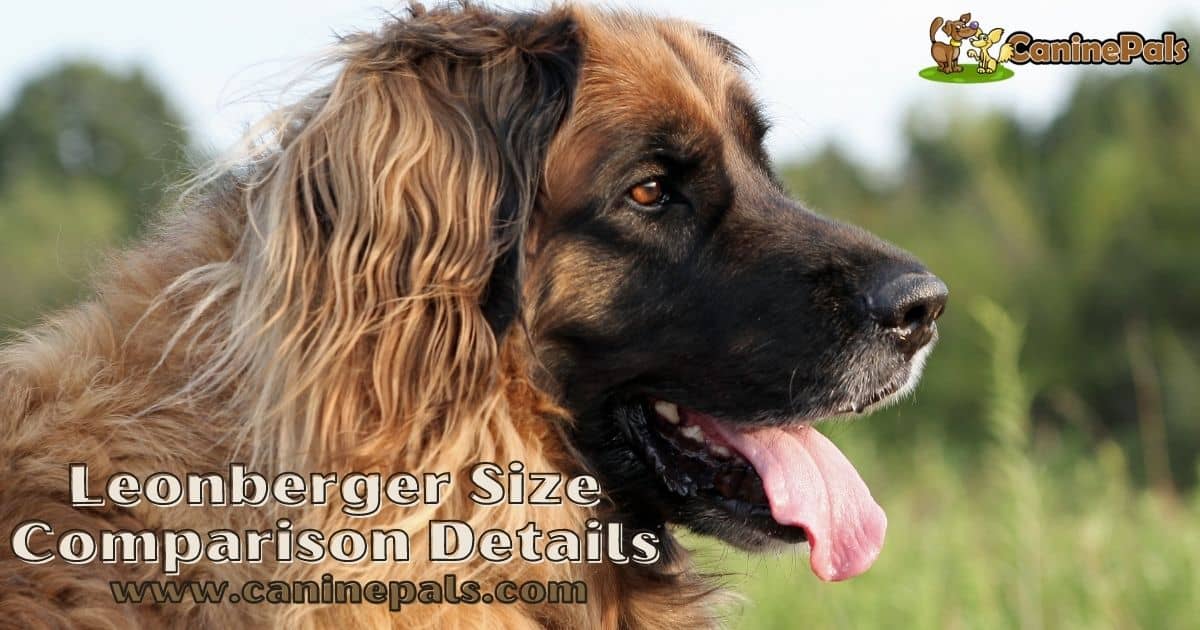Last Updated on February 15, 2024 by Denise Leo. Post first published on February 14, 2022.
The Leonberger is a giant dog breed with a thick mane around their necks that favors a lion. They are certainly majestic large dogs – a true sight to behold. But do you know just how big these lovable giants are? Find out as we explore details of Leonberger size comparison.
Just a quick glance shows that it’s not surprising that the Leonbergers are one of the largest dog breeds around. After all, as if their size alone wasn’t large enough, they look like a lion with their thick mane and fur!
Despite their enormous size, they are known for being very gentle and patient in nature and make great companion dogs. They are among the most affectionate of all dog breeds around and are known for being great with families and other dog breeds.
Leonberger Puppy Size
Let’s have a look at the Leonberger puppy’s average weight:
| Leonberger age | Leonberger puppy weight |
| 3 Months | 36.6 – 50 pounds |
| 4 Months | 48.7 – 66.6 pounds |
| 5 Months | 58.6 – 80.9 pounds |
| 6 Months | 68.1 – 94.5 pounds |
| 7 Months | 74.5 – 106.9 pounds |
| 8 Months | 81.4 – 117.3 pounds |
| 9 Months | 87.5 – 123.7 pounds |
| 10 Months | 93 – 130.1 pounds |
| 11 Months | 94.7 – 139.3 pounds |
| 12 Months | 98.7 – 146.7 pounds |
Figuring out their weight will help you to track their development every step of the way. Every Leonberger puppy is unique and their weight might vary. The important thing to note is that your puppy is making progress. Don’t worry if your Leonberger puppy doesn’t follow this weight formula exactly, though. As long as your furry child seems healthy, energetic, and active, you don’t need to worry.

How Big is a Leonberger?
According to the American Kennel Club, the Leonberger breed is a lush-coated giant dog breed of German origin. This huge and powerful dog is also known for his aristocratic grace and elegance. Leonberger males are bulkier and taller than their female counterparts.
Let’s have a look at American Kennel Club Leonberger’s average height and weight.
- Average Height:
- Males: 28-31.5 inches
- Females: 25.5-29.5 inches
- Average Weight:
-
-
- Males: 110-170 pounds
- Females: 90-140 pounds
-
- Life Expectancy: 7 years
Pro Tip: To get an idea of how big the Leonberger will get is to take a look at their parents. Usually, Leonbergers will be an average of both their parents’ size.

Human vs. Leonberger Size Comparison
Wondering just how you would size up to these giant giants? Leos can be taller than a human when standing on their hind legs!
Leonbergers weigh as much as, if not more than, the average full-grown human. However, if you were to place that same Leonberger on the scale with the average 3-year-old, it would take nearly 6 children to weigh the same as Leo. Wow! That’s an entire pre-kindergarten class!
Leonbergers vs Giant Breeds – Size Comparison
The Leonberger dog breed was developed through the combination of a Saint Bernard and a Newfoundland to create a truly majestic companion fit for royalty.
While the Leonberger may not be the biggest of all dog breeds, there’s no denying that these gentle giants are truly majestic and giant! And this Leo size comparison will show you just how true that is by comparing them against Great Danes, Kangal Dog, Newfoundland, and many more dog breeds.
Leonberger vs Saint Bernard
- Leonberger Height: 28-31.5 inches
- Leonberger Weight: 110-170 pounds
- Saint Bernard Height: 25.5-27.5 inches
- Saint Bernard Weight: 110-200 pounds
Leonberger vs Kangal Dog
- Leonberger Height: 28-31.5 inches
- Leonberger Weight: 110-170 pounds
- Kangal Dog Height: 28-34 inches
- Kangal Dog Weight: 85-150 pounds
Leonberger vs Newfoundland Dog
- Leonberger Height: 28-31.5 inches
- Leonberger Weight: 110-170 pounds
- Newfoundland Height: 26-28 inches
- Newfoundland Weight: 100-150 pounds
Leonberger vs Great Dane
- Leonberger Height: 28-31.5 inches
- Leonberger Weight: 110-170 pounds
- Great Dane Height: 28-32 inches
- Great Dane Weight: 110-175 pounds
Leonberger vs Bernese Mountain Dog
- Leonberger Height: 28-31.5 inches
- Leonberger Weight: 110-170 pounds
- Bernese Mountain Dog Height: 23-27.5 inches
- Bernese Mountain Dog Weight: 70-115 pounds
Leonberger vs Bullmastiff
- Leonberger Height: 28-31.5 inches
- Leonberger Weight: 110-170 pounds
- Bullmastiff Height: 24-27 inches
- Bullmastiff Weight: 100-130 pounds
Leonberger vs Dogue de Bordeaux
- Leonberger Height: 28-31.5 inches
- Leonberger Weight: 110-170 pounds
- Dogue de Bordeaux Height: 23-27 inches
- Dogue de Bordeaux Weight: starts at 100 pounds
Leonberger vs Cane Corso
- Leonberger Height: 28-31.5 inches
- Leonberger Weight: 110-170 pounds
- Cane Corso Height: 23.5-27.5 inches
- Cane Corso Weight: 90-120 pounds
Leonberger vs Great Pyrenees
- Leonberger Height: 28-31.5 inches
- Leonberger Weight: 110-170 pounds
- Great Pyrenees Height: 25-32 inches
- Great Pyrenees Weight: 85-160 pounds
Leonberger vs Neapolitan Mastiff
- Leonberger Height: 28-31.5 inches
- Leonberger Weight: 110-170 pounds
- Neapolitan Mastiff Height: 24-31 inches
- Neapolitan Mastiff Weight: 110-150 pounds
Leonberger vs Tibetan Mastiff
- Leonberger Height: 28-31.5 inches
- Leonberger Weight: 110-170 pounds
- Tibetan Mastiff Height: 24-26 inches
- Tibetan Mastiff Weight: 70-150 pounds

When do Leonbergers Stop Growing?
Leonbergers go through distinct developmental periods just like other dogs do. Of course, the larger the dog, the longer it takes for him to grow into his final size. The first few months of a Leonberger’s life are a time of rapid development. However, Leonbergers continue to grow and develop much longer than many other dog breeds.
Both male and female Leonbergers will reach a full height at about 18 – 22 months. They still have some weight to gain before they have reached their adult bulk. Leonbergers continue to develop muscles and gain healthy bulk up to the age of about 3 years. Usually, Leonbergers will attain mental maturity when they are around 3 years of age with the proper training in place.
Remember that these are averages and may vary slightly. Female Leonbergers don’t get as bulky as males. Females usually reach their final size before males do because they run slightly smaller than their male counterparts.
What if My Leonberger Puppy is Losing Weight?
Healthy and active Leo puppies should never lose weight. If your Leo puppy is losing weight, it might be a sign of an underlying illness. It’s best to talk to a veterinary professional and address this issue immediately.
Health Risks During Leonberger Growth
Leonbergers are generally healthy dogs. However, some conditions may affect them during growth. These health concerns include:
- The Leonberger breed has a high incidence of orthopedic problems such as hip and elbow dysplasia, osteochondritis dissecans, and panosteitis.
- Eye diseases including cataracts, entropion, and ectropion are a cause of concern.
- You can expect that your Leonberger may suffer from bloating. This is where your stomach twists and there is gas trapped inside.
- All kinds of parasites and worms can invade your Leonberger’s body, inside and out.
Not all of these conditions are detectable in a growing puppy and some don’t appear until later in life. An overweight Leonberger puppy might become obese in adulthood. Also, there are health risks including arthritis, diabetes, or heart problems, associated with obesity.

Factors that Affect Leonberger’s Growth
Here are some factors that affect the growth of the Leonbergers:
- Genetics
Your Leonberger’s genetics can determine whether it will be taller, shorter, or more prone to weight gain. Some genetic health conditions could affect your Leonberger puppy’s growth.
If your Leonberger is the pick of the litter, it will be stronger and bigger by nature. If your canine is the runt of the litter, it will be smaller by nature.
- Nutrition
Diet has a huge effect on your Leonberger’s weight. Good nutrition can determine how well your Leonberger is growing. Healthy and good food supports normal growth and maintains the puppy at a healthy weight and better body condition.
- Parasites
Parasites are a very common cause of weight loss or a lack of weight gain in Leonberger. These parasites and intestinal worms can steal enough calories from the puppy to slow its growth. Leonberger puppies that have a heavy worm burden typically look small and unhealthy.
- Physical activity
Another factor that will affect your Leonberger’s weight is its physical activity. Leonbergers require a good amount of exercise to keep them healthy and prevent them from getting overweight.
- Health and ailment
Good health is important for growing puppies. Your Leonberger might be short and underweight due to an illness. If it seems sick, the best option is to take your dog to a vet.
- Anxiety:
Your Leonberger might be stressed, which is causing it to lose weight.
About the Leonberger
The Leonberger originated from Leonberg, Germany, in the 1800s as a farm, draft, and family dog. He was often used as a model for German artists and on some European countries’ stamps. He almost became extinct after WWI but was recreated from a few other dogs.
He’s a gentle, calm dog willing to please and ideal as a therapy dog. The Leonberger is recognized by the American Kennel Club. Even though he’s a big dog, he’s graceful and light on his feet. He can have a sandy, red, brown, or yellow-brown coat color and always “wears” a black mask. He loves children and, with consistent training, makes a great pet. His double coat sheds heavily, so it needs to be brushed every day. He requires a moderate amount of exercise. His height is 25.5 – 31.5 inches.

Final Thoughts on Leonberger Size Comparison
Large, fluffy, and soulful, the Leonberger is a dog breed you should get to. Despite their massive size, they’re actually wonderful to live with, as most prefer to relax all day and are relatively calm inside the house. The Leonberger’s size hasn’t stopped them from becoming superb family dogs.
A healthy diet, a stress-free environment, and physical and mental stimulation will help your Leonberger develop and grow greatly.
Leonbergers make great pets for families due to their playful and loving nature. This dog breed is highly energetic and is likely to get bored if not exercised properly.
If you liked this article, make sure you check out the rest of the posts on the website.
Copyright CaninePals. All Rights Reserved.
References and Further Reading:
American Kennel Club Leonberger Information


